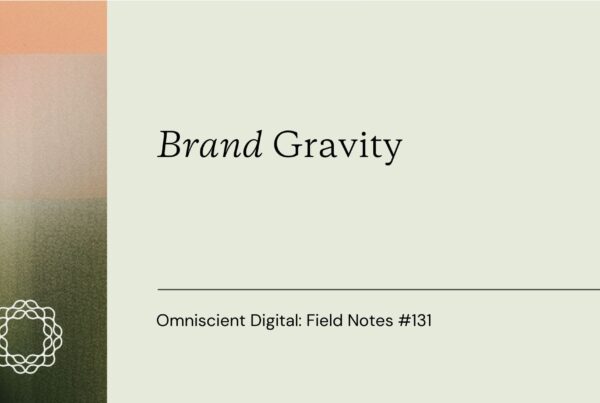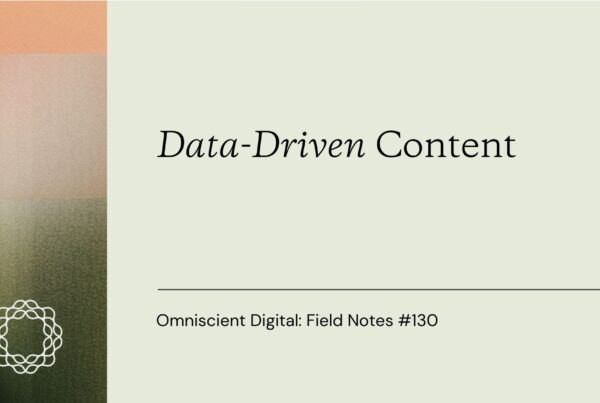
I’ve been thinking a lot about how we judge marketing success and what drives those wins—or, more accurately, what we think drives them.
It’s easy to point at a company and say, “They nailed it because of X,” but often, we’re just seeing the glow of the Halo Effect, not the raw causal mechanics.
What’s the Halo Effect? In short, it’s a cognitive bias where our overall impression of something influences our perception of its individual aspects. A company that’s winning in the market? Everything they do looks brilliant. A marketer from a top-tier company? Their ideas must be golden, right? But that’s not always the full story.
Post Hoc Ergo Propter Hoc
I wrote this newsletter and scheduled it on Sunday. So I don’t know what the election results (in the states) will be.
But I do know that, whoever wins, there will be a whole lot of analysis on why they won.
And the outcome will alter the analysis. Meaning candidate A did [thing], and if they won, [thing] will be looked at as a causal factor in why they won. And if they lost, [thing] may be blamed for the loss.
This actually happened in 2008, and I know because one of the “causal factors” was the Obama campaign’s use of A/B testing, which Optimizely leveraged to great effect afterwards to market their product.

If you’re a longtime reader, you know me, and you know that I love A/B testing and built my career in experimentation. I hope you also know that I’m intellectually honest enough to say that it probably wasn’t A/B testing alone that determined the 2008 election.
And if he had lost? Would we be talking about how the team had wasted their time A/B testing CTAs when they could have been doing [alternative thing]? Probably.
That Latin phrase above roughly translates to “after this therefore because of this,” and the West Wing explained it better than anyone (watch the clip – seriously, it explains in 1 minute what my whole essay is trying to say):
“One thing follows the other, therefore it was caused by the other. But it’s not always true. In fact, it’s hardly ever true. We did not lose Texas because of the hat joke.”
Our understanding of an outcome can impact our analysis of the decisions that went into it. In poker, this concept is known as “resulting,” and it’s generally a really bad way to make sense of the world and decision making.
A Tale of Two Cities (and Campaign Outcomes)
You can try the exact same thing at two different companies and have two completely different results.
Consider the stories we tell ourselves about successful companies.
Monday.com is heralded for its content marketing strategy, and sure, it worked well. But was it the sheer scale of their editorial efforts that was truly the standout factor? Their relentless YouTube ad blitz and diversified marketing efforts, driven by millions in spend, may have had some impact, too, no? Meanwhile, lesser-known competitors with similar strategies didn’t get the same spotlight, despite impressive (and efficient) SEO results.
And then there’s the famous Zapier example.
They’ve become the poster child for programmatic SEO, especially with their integrations library. It inspired many hundreds of companies to try a similar playbook, yet few achieved the same success (I know firsthand, having worked at a similar, but more enterprise-focused, company who tried that playbook).
So their SEO playbook was solid, yes.
But they nailed their product where competitors like IFTTT and automate.io fell short. They had really, really good timing, and they combined their programmatic playbook with really solid editorial content.
I’m not trying to do a causal analysis or fake case study.
And look, under the principle of intellectual honesty, I have to tell you something: the work we did with Jasper was excellent ($4M+ in attributable ARR to the blog). But what else did we have going for us? Oh, the massive, massive tailwind of generative AI demand from the market (and a great product, and solid product marketing, and a good affiliate program). Yeah, that may have helped our listicles get traffic and conversions, too.
The point is, you can’t look at the end result of their success, reverse engineer what they did for programmatic, and cargo cult your way to a similar result. The halo effect surrounded their brand, making every move look like a stroke of genius.
Creepy or Clever? Depends if You’re Handsome
Dumb example: Guy at a bar walks up to someone he fancies, uses a super cheesy pick-up line. Is it effective? Depends. If he’s handsome, an “objective” analyst may not think that the cheesy pick-up line worked because it was clever and self-deprecating. If he’s not handsome, well, it failed because he was just incredibly creepy. Who would use such a line?
(I’m not being crude here; the initial research on the halo effect studied attractive people and how we tend to view them as more intelligent, likable, etc. despite having no evidence for these traits).
I’ve experienced this firsthand from a business context.
People often react most positively to my time at HubSpot, automatically attributing a halo of brilliance to anything I touched there. In my humble opinion, I did much more innovative and interesting work at CXL, but mentioning my experience there doesn’t impress people as much.
I recall once seeing a blogger do a full breakdown of an outreach email campaign I ran at HubSpot, dissecting it in glowing detail, praising it as a masterstroke of persuasion. In reality, it was fairly standard, almost formulaic, and personally, I think the most impactful element was not the subject line, but the “From” email address being @hubspot.com.
If you know anything about SEO in 2024, you know that brand has a big impact. As it turns out, you can write much better content, but well-known brands are almost always going to outrank you, and Occam’s razor says that it’s because people are more likely to click a Forbes link than an alexbirkett.com link (though again, other factors like links, quality, technical, yada yada are also at play).
The Halo in Leadership Perceptions
It’s not just in campaigns—it’s in how we perceive leaders.
Take Steve Jobs, right? Famously a micromanager and a bit of an asshole. But also a visionary. Post hoc narratives paint them as visionaries whose every quirk contributed to their success.
But here’s the question: did they thrive because they acted like micromanaging assholes or despite that? The answer isn’t as neat as the stories make it seem.
Thought leaders like Simon Sinek, Jim Collins, and others get this wrong constantly, painting a particular trait as the “cause” of a brand or leader’s success, whereas it may have been a positive, neutral, or even a negative impact on performance.
This bias even affects how we judge experts.
An ex-Uber marketer or an ex-Salesforce exec? They must be sharp. But real expertise isn’t always where the halo shines brightest. In emerging fields like AI, we see this vividly—those with brand clout or social media savvy rise to prominence, overshadowing quiet experts tinkering in the background. That’s why I try to look for “underpriced” people when I seek out who to follow and learn from.
Why This Matters for Your Marketing
So why should you care?
Because the Halo Effect can mislead us into copying what looks successful without asking the harder question: Did this succeed because of the strategy, or was the strategy just along for the ride? It’s tempting to reverse-engineer wins without realizing the unseen scaffolding—like budget, brand trust, or other tailwinds.
It’s the same reason Tim Ferriss advises learning from the scrappy runner-up rather than the untouchable gold medalist. The former can teach you practical, repeatable lessons, while the latter may be riding on unique, unreplicable advantages (and may even be winning in spite of suboptimal training and systems).
Recognizing the Halo Effect doesn’t mean we throw out all admiration for successful campaigns. It means we question assumptions and dig deeper into the why.
Before replicating another company’s strategy, ask if you share their hidden advantages—or if there’s a smarter way tailored to your context.
Speaking of Steve Jobs and the Halo Effect, we should talk about one of the most famous advertising campaigns of all time: Apple’s Think Different ad.
I love this ad, and so do many of you. But have we historically overrated its impact on the company’s performance? Probably. John James did a masterful multi-part breakdown of the campaign and its impact. Here’s a quote from part 5.3:
“Within the marketing industry there seems to be a strong tendency to attribute cherry-picked campaigns to periods of business success, rather than recognizing it’s part of a much bigger picture. This oversight may be a byproduct of the advertising agency era where marketer’s spent most of their time and budgets on promotions and ad campaigns. There is also a tendency for marketers to ignore the product experience, opting instead to focus on “building the brand” by exposing aspirational ideals.”
Bolding mine. It’s hard to parse out what makes a company or campaign successful, but it’s important that we try to do so, think from first principles for our own campaigns, and rely on our own data and experiments to inform our decisions.
Think different? Sure, but more importantly, think for yourself!
Want more insights like this? Subscribe to our Field Notes.


